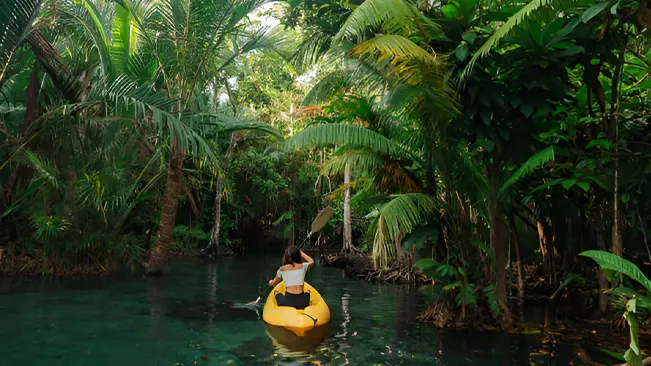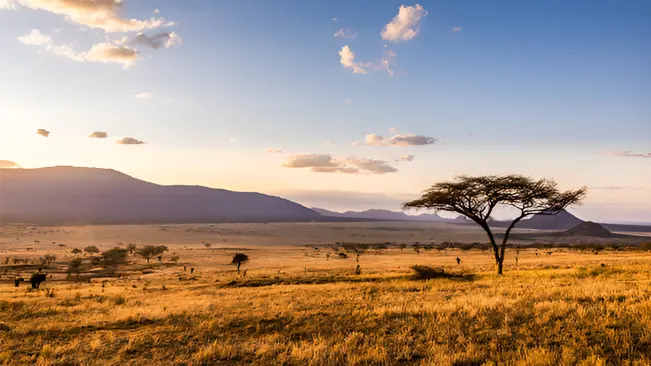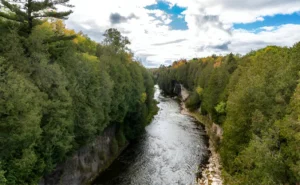How Ecotourism Benefits the Environment and Local Communities
- August 16, 2024
- 0 comment
Ecotourism is changing the way people travel by focusing on sustainability and benefiting both the environment and local communities. This approach not only helps protect natural areas but also supports local economies, creating a positive connection between conservation and community development. By encouraging responsible travel, ecotourism promotes ecological preservation and offers long-term economic benefits to the people who live in these regions.
What is Ecotourism?
Ecotourism is a form of sustainable travel that focuses on protecting the environment and supporting local communities. Its main purpose is to let travelers explore and appreciate nature while minimizing harm to the natural world. Ecotourism often involves visiting places rich in wildlife, plants, and cultural heritage, offering a unique chance to learn about and connect with these natural wonders.

This type of travel emphasizes responsible practices, such as conserving resources and improving the well-being of local people. By following these principles, ecotourism reduces the negative effects of tourism on the environment and encourages a deeper appreciation of nature among visitors.
One of the benefits of ecotourism is that it provides financial support for conservation projects while boosting the local economy. This approach not only helps preserve natural resources but also offers economic opportunities to local communities, ensuring a sustainable future for everyone involved.
The Benefits of Ecotourism
Ecotourism provides a responsible way for travelers to explore nature while minimizing their impact on the environment. One of the major benefits of ecotourism is its focus on reducing pollution and managing waste effectively. Travelers are encouraged to conserve energy, adopt renewable energy sources like solar power, and avoid single-use plastics. These practices help keep natural areas pristine and protect them from environmental damage.

Another important aspect is how ecotourism benefits local communities. By supporting locally owned businesses and initiatives, ecotourism channels funds directly into the hands of residents. This boosts local economies, creates jobs, and empowers communities to preserve their cultural heritage and natural resources.
Ecotourism also promotes education and awareness, helping travelers better understand the importance of conservation. Through sustainable practices, it fosters a deeper connection with nature while ensuring the environment and local communities thrive together.
How Ecotourism Benefits Local Communities
Ecotourism plays a significant role in improving the well-being of local communities by boosting their economies. When travelers spend on local services like lodging, dining, and guided tours, it generates income that directly supports residents. It also creates jobs in areas such as guiding, hospitality, and transportation, while encouraging the sale of local crafts and traditional foods. This income helps fund community services, improve infrastructure, and raise living standards, ultimately contributing to poverty reduction and ensuring that economic benefits are shared locally.

Another key social impact of ecotourism is the promotion of cultural preservation and education. By fostering meaningful interactions between tourists and local communities, ecotourism helps travelers appreciate unique traditions and heritage. This exchange not only enhances cultural pride among residents but also fosters mutual understanding and respect, creating a deeper connection between people and their environment.
How Ecotourism Benefits the Environment
Ecotourism plays a vital role in conserving the environment, especially in places like national parks and protected areas. Travelers are encouraged to minimize their ecological impact by staying on designated trails to avoid harming local plants and wildlife. A key principle of sustainable travel benefits is ensuring no waste, such as plastic bottles or other non-biodegradable items, is left behind, as these can cause lasting damage to fragile ecosystems.

Responsible ecotourism also helps address the environmental challenges caused by traditional tourism, such as deforestation and pollution from poorly managed activities like camping or fishing. By educating visitors about the importance of proper waste disposal, respecting wildlife, and preserving natural landscapes, ecotourism fosters sustainable practices. These efforts contribute to the long-term protection of natural areas, ensuring they remain healthy and vibrant for future generations.
The Main Principles of Ecotourism
1. Respect the local culture
One of the core principles of ecotourism is respecting the culture of the communities you visit. Responsible travelers honor the customs, beliefs, and traditions of locals by adapting their behavior. This might include dressing modestly at religious or cultural sites, asking for permission before taking photos of people, and being mindful of language and food choices that may hold cultural significance. Showing this level of respect helps build mutual understanding and creates a more meaningful travel experience by fostering authentic connections with the community.

By observing local norms and etiquette, travelers can ensure their presence is positive and non-disruptive. This not only makes visitors more welcome but also strengthens cultural pride within the community. Preparing in advance by learning about local practices and expectations demonstrates genuine respect and contributes to the social impact of ecotourism, creating a more inclusive and enriching experience for everyone involved.
2. Support local businesses
Supporting local businesses is a key principle of sustainable tourism and a significant way travelers can positively impact the communities they visit. By shopping at local markets, eating at family-owned restaurants, and choosing locally-run accommodations, tourists help keep money within the community. This practice supports small businesses, preserves local jobs, and strengthens the local economy.

Engaging with local businesses also offers a richer travel experience. Tourists can discover unique products like traditional crafts and enjoy authentic regional cuisine that reflects the area’s culture and heritage. These experiences provide a deeper connection to the destination while promoting the economic benefits of ecotourism.
3. Do not take souvenirs from protected areas
When visiting natural areas such as national parks, it’s crucial to leave the environment as you found it. This means taking all your trash with you to avoid pollution and protect wildlife, as well as resisting the temptation to take natural souvenirs like rocks, plants, or other materials from protected areas. Removing such items can disrupt local ecosystems, harm biodiversity, and degrade the natural heritage that makes these locations special.

Tourists should also be aware of the long-term negative impacts that removing souvenirs from natural settings can have on ecological health and the visual aesthetics of the environment. By adhering to the principle of “leave no trace,” visitors ensure that these precious natural resources remain intact and vibrant for future generations to enjoy. Promoting and practicing such environmental responsibility supports conservation efforts and maintains the natural allure of these protected areas.
4. Use sustainable transportation
Choosing sustainable transportation during travel benefits both the environment and local communities. Opting for eco-friendly options like biking, walking, or using public transit helps reduce carbon emissions, decrease traffic congestion, and minimize the overall environmental impact of tourism. These methods not only support the goals of sustainable travel benefits but also allow travelers to experience the local area in a more immersive and meaningful way.

Sustainable transportation is often cost-effective and promotes health benefits, such as increased physical activity and reduced stress. By incorporating environmentally conscious travel methods, tourists contribute to the positive effects of ecotourism, aligning their actions with the principles of sustainability and environmental preservation.
Why Should You Choose Ecotourism?
Choosing ecotourism allows you to explore breathtaking destinations while making a positive impact on the environment and local communities. This form of travel encourages you to connect with local cultures, customs, and traditions, providing a richer and more meaningful experience. More importantly, ecotourism advantages include conserving natural resources, reducing your carbon footprint, and promoting sustainable practices. By staying in eco-friendly accommodations, minimizing energy use, and supporting initiatives that protect wildlife and ecosystems, you help ensure these beautiful locations are preserved for future generations.

Ecotourism often includes opportunities for travelers to participate in conservation efforts, such as volunteering for local projects or attending sustainability workshops. These activities not only enhance your experience but also contribute to ecotourism economic benefits by supporting local economies through sustainable jobs. To get the most out of your ecotourism journey, research local environmental guidelines, respect wildlife, and follow local customs and legal restrictions. This responsible approach makes ecotourism a powerful way to travel sustainably while leaving a positive impact.
FAQs
- What is ecotourism?
Ecotourism is a form of sustainable travel that focuses on visiting natural areas, contributing to environmental conservation, and improving the well-being of local people. It encourages low-impact behaviors and promotes environmental awareness among travelers. - How does ecotourism benefit the environment?
Ecotourism helps protect the environment by fostering a deep appreciation for nature among tourists. Activities are designed to minimize impact on natural resources, support the conservation of habitats, and reduce pollution through sustainable practices. - In what ways does ecotourism support local communities?
Ecotourism contributes to local economies by creating jobs that depend on sustainable practices, such as guiding, hospitality, and local artisan crafts. It also channels funds directly into community projects that enhance education, infrastructure, and health care. - Can ecotourism help in wildlife conservation?
Yes, ecotourism plays a significant role in wildlife conservation by funding reserves and parks and educating tourists about the importance of biodiversity. It also helps regulate access to sensitive environments, reducing illegal activities like poaching. - What are the best practices for a tourist to follow when engaging in ecotourism?
Tourists should adhere to guidelines such as staying on marked trails, using Eco-friendly products, supporting local businesses, and respecting cultural norms and traditions. Avoiding activities that harm the environment or disrupt local communities is also crucial. - How does ecotourism promote cultural preservation?
Ecotourism encourages respectful cultural exchange. Tourists learn about and participate in local traditions and ways of life, which helps preserve and celebrate unique cultural identities while providing economic benefits from these cultural interactions. - What should I consider before choosing an ecotourism destination?
Research the ecotourism credentials of a destination to ensure they adhere to genuine sustainable practices. Look for certifications from recognized organizations and check reviews from previous visitors to understand the impact and authenticity of the ecotourism activities offered. - Are there any negative effects of ecotourism?
If not managed properly, ecotourism can lead to over visitation, which might strain local resources and disrupt wildlife. Effective management and regulation are essential to mitigate such impacts and ensure that ecotourism remains a positive force for the environment and local communities.

Joel Cunningham
Forestry AuthorI'm Joel Cunningham, an expert in pruning and weed management with over a decade of experience. My skills are rooted in formal training and extensive practice, focusing on advanced pruning techniques and efficient weed control. I'm known for my quality work, precision, and deep understanding of plant health and soil dynamics. My contributions extend to educational initiatives where I share sustainable practices and advice, establishing myself as a reliable and authoritative figure in the gardening community.













Leave your comment